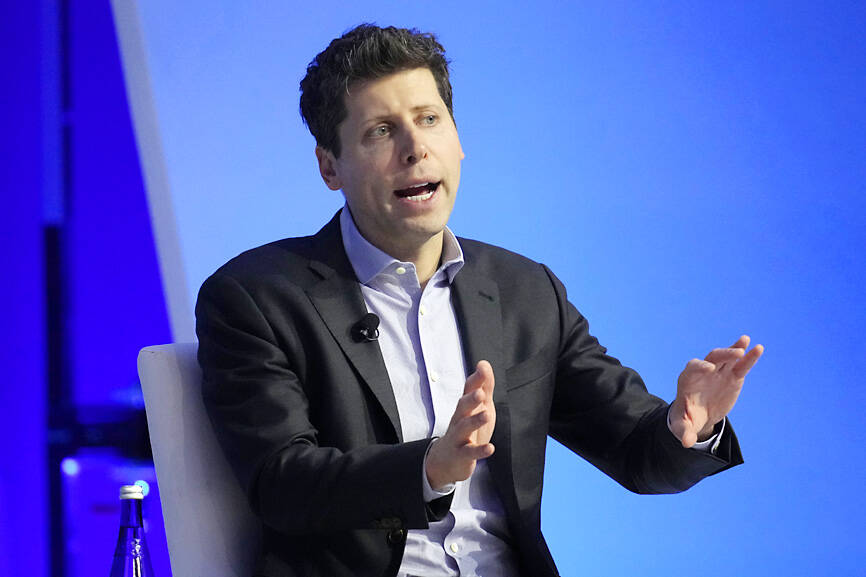Microsoft Corp CEO Satya Nadella yesterday announced the hiring of OpenAI’s (OAI) Sam Altman and other members of his team, days after the cofounder of the venture behind ChatGPT was fired.
OpenAI’s board sacked Altman on Friday, with US media citing concerns that Altman was underestimating the dangers of its tech and leading the company away from its stated mission — claims his successor as CEO has denied.
Altman shot to fame with the launch of its artificial intelligence (AI) chatbot last year, which ignited a race to advance AI research and development, with billions being invested in the sector.

Photo: AP
Nadella wrote on X, formerly Twitter, that Altman “will be joining Microsoft to lead a new advanced AI research team,” along with OpenAI cofounder Greg Brockman and other colleagues.
“The mission continues,” Altman posted on X.
Altman’s sacking triggered several other high-profile departures from the company, as well as a reported push by major investors to bring him back.
Microsoft was among several high-profile OpenAI investors that were trying to restore Altman as CEO, US media reported.
Yet OpenAI stood by its decision in a memo sent to employees on Sunday night, saying that “Sam’s behavior and lack of transparency ... undermined the board’s ability to effectively supervise the company,” the New York Times reported.
OpenAI appointed Emmett Shear, a former chief executive of Amazon.com Inc’s Twitch streaming service, as interim CEO, he wrote in a post on X yesterday.
Shear also denied reports that Altman had been fired over safety concerns regarding the use of AI.
“Today I got a call inviting me to consider a once-in-a-lifetime opportunity: to become the interim CEO of @OpenAI. After consulting with my family and reflecting on it for just a few hours, I accepted,” he wrote.
“Before I took the job, I checked on the reasoning behind the change. The board did not remove Sam over any specific disagreement on safety, their reasoning was completely different from that,” he added.
Microsoft CEO Nadella wrote in his post that “we look forward to getting to know Emmett Shear and OAI’s new leadership team and working with them.”
“We remain committed to our partnership with OpenAI and have confidence in our product roadmap,” he said.
Microsoft has invested more than US$10 billion in OpenAI and has rolled out the AI pioneer’s tech in its own products.

The US dollar was trading at NT$29.7 at 10am today on the Taipei Foreign Exchange, as the New Taiwan dollar gained NT$1.364 from the previous close last week. The NT dollar continued to rise today, after surging 3.07 percent on Friday. After opening at NT$30.91, the NT dollar gained more than NT$1 in just 15 minutes, briefly passing the NT$30 mark. Before the US Department of the Treasury's semi-annual currency report came out, expectations that the NT dollar would keep rising were already building. The NT dollar on Friday closed at NT$31.064, up by NT$0.953 — a 3.07 percent single-day gain. Today,

‘SHORT TERM’: The local currency would likely remain strong in the near term, driven by anticipated US trade pressure, capital inflows and expectations of a US Fed rate cut The US dollar is expected to fall below NT$30 in the near term, as traders anticipate increased pressure from Washington for Taiwan to allow the New Taiwan dollar to appreciate, Cathay United Bank (國泰世華銀行) chief economist Lin Chi-chao (林啟超) said. Following a sharp drop in the greenback against the NT dollar on Friday, Lin told the Central News Agency that the local currency is likely to remain strong in the short term, driven in part by market psychology surrounding anticipated US policy pressure. On Friday, the US dollar fell NT$0.953, or 3.07 percent, closing at NT$31.064 — its lowest level since Jan.

Hong Kong authorities ramped up sales of the local dollar as the greenback’s slide threatened the foreign-exchange peg. The Hong Kong Monetary Authority (HKMA) sold a record HK$60.5 billion (US$7.8 billion) of the city’s currency, according to an alert sent on its Bloomberg page yesterday in Asia, after it tested the upper end of its trading band. That added to the HK$56.1 billion of sales versus the greenback since Friday. The rapid intervention signals efforts from the city’s authorities to limit the local currency’s moves within its HK$7.75 to HK$7.85 per US dollar trading band. Heavy sales of the local dollar by

The Financial Supervisory Commission (FSC) yesterday met with some of the nation’s largest insurance companies as a skyrocketing New Taiwan dollar piles pressure on their hundreds of billions of dollars in US bond investments. The commission has asked some life insurance firms, among the biggest Asian holders of US debt, to discuss how the rapidly strengthening NT dollar has impacted their operations, people familiar with the matter said. The meeting took place as the NT dollar jumped as much as 5 percent yesterday, its biggest intraday gain in more than three decades. The local currency surged as exporters rushed to